
torchtune
A Native-PyTorch Library for LLM Fine-tuning
Stars: 4061
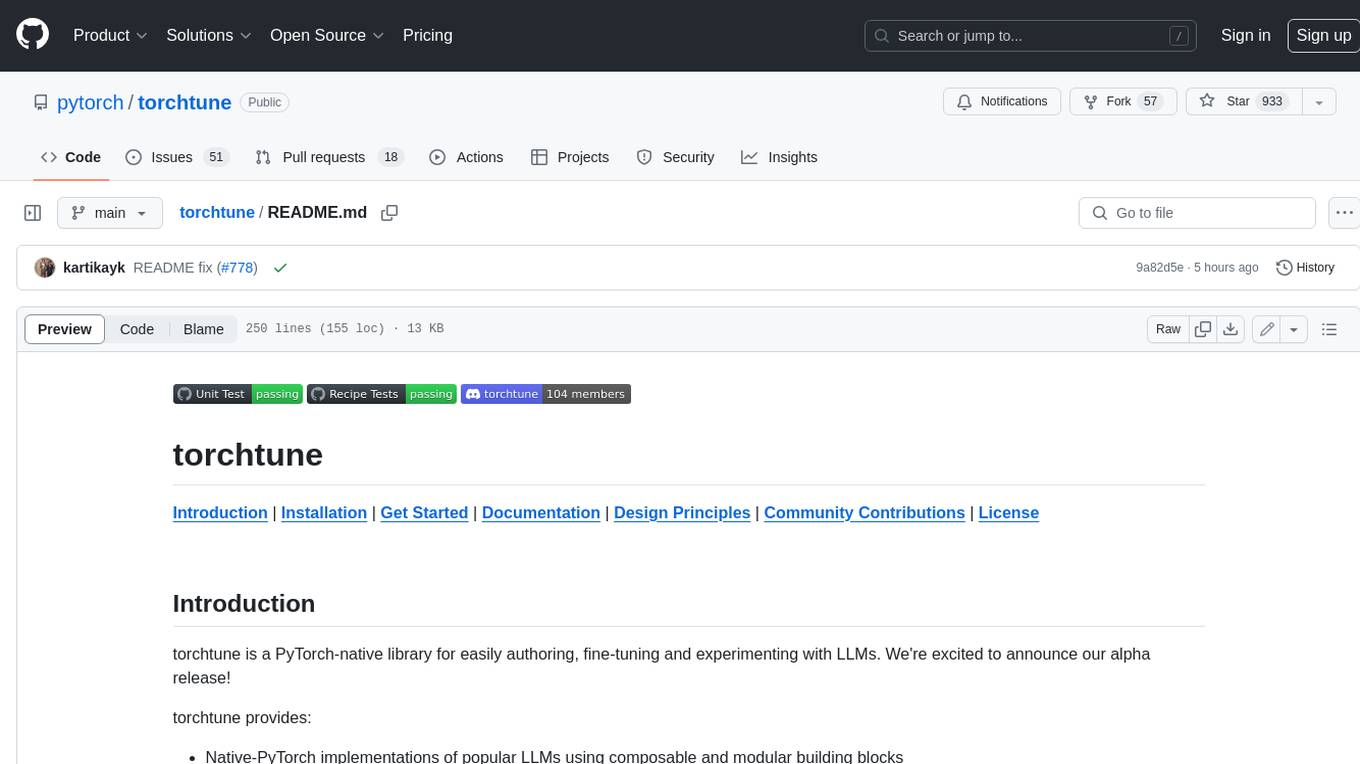
Torchtune is a PyTorch-native library for easily authoring, fine-tuning, and experimenting with LLMs. It provides native-PyTorch implementations of popular LLMs using composable and modular building blocks, easy-to-use and hackable training recipes for popular fine-tuning techniques, YAML configs for easily configuring training, evaluation, quantization, or inference recipes, and built-in support for many popular dataset formats and prompt templates to help you quickly get started with training.
README:
Introduction | Installation | Get Started | Documentation | Community | License
[!IMPORTANT] Update September 25, 2024: torchtune has support for Llama 3.2 11B Vision, Llama 3.2 3B, and Llama 3.2 1B models! Try them out by following our installation instructions here, then run any of the text configs here or vision configs here.
torchtune is a PyTorch library for easily authoring, finetuning and experimenting with LLMs.
torchtune provides:
- PyTorch implementations of popular LLMs from Llama, Gemma, Mistral, Phi, and Qwen model families
- Hackable training recipes for full finetuning, LoRA, QLoRA, DPO, PPO, QAT, knowledge distillation, and more
- Out-of-the-box memory efficiency, performance improvements, and scaling with the latest PyTorch APIs
- YAML configs for easily configuring training, evaluation, quantization or inference recipes
- Built-in support for many popular dataset formats and prompt templates
torchtune currently supports the following models.
| Model | Sizes |
|---|---|
| Llama3.2-Vision | 11B [models, configs] |
| Llama3.2 | 1B, 3B [models, configs] |
| Llama3.1 | 8B, 70B, 405B [models, configs] |
| Llama3 | 8B, 70B [models, configs] |
| Llama2 | 7B, 13B, 70B [models, configs] |
| Code-Llama2 | 7B, 13B, 70B [models, configs] |
| Mistral | 7B [models, configs] |
| Gemma | 2B, 7B [models, configs] |
| Microsoft Phi3 | Mini [models, configs] |
| Qwen2 | 0.5B, 1.5B, 7B [models, configs] |
We're always adding new models, but feel free to file an issue if there's a new one you would like to see in torchtune.
torchtune provides the following finetuning recipes for training on one or more devices.
| Finetuning Method | Devices | Recipe | Example Config(s) |
|---|---|---|---|
| Full Finetuning | 1-8 |
full_finetune_single_device full_finetune_distributed |
Llama3.1 8B single-device Llama 3.1 70B distributed |
| LoRA Finetuning | 1-8 |
lora_finetune_single_device lora_finetune_distributed |
Qwen2 0.5B single-device Gemma 7B distributed |
| QLoRA Finetuning | 1-8 |
lora_finetune_single_device lora_finetune_distributed |
Phi3 Mini single-device Llama 3.1 405B distributed |
| DoRA/QDoRA Finetuning | 1-8 |
lora_finetune_single_device lora_finetune_distributed |
Llama3 8B QDoRA single-device Llama3 8B DoRA distributed |
| Quantization-Aware Training | 4-8 | qat_distributed | Llama3 8B QAT |
| Direct Preference Optimization | 1-8 |
lora_dpo_single_device lora_dpo_distributed |
Llama2 7B single-device Llama2 7B distributed |
| Proximal Policy Optimization | 1 | ppo_full_finetune_single_device | Mistral 7B |
| Knowledge Distillation | 1 | knowledge_distillation_single_device | Qwen2 1.5B -> 0.5B |
The above configs are just examples to get you started. If you see a model above not listed here, we likely still support it. If you're unsure whether something is supported, please open an issue on the repo.
Below is an example of the memory requirements and training speed for different Llama 3.1 models.
[!NOTE] For ease of comparison, all the below numbers are provided for batch size 2 (without gradient accumulation), a dataset packed to sequence length 2048, and torch compile enabled.
If you are interested in running on different hardware or with different models, check out our documentation on memory optimizations here to find the right setup for you.
| Model | Finetuning Method | Runnable On | Peak Memory per GPU | Tokens/sec * |
|---|---|---|---|---|
| Llama 3.1 8B | Full finetune | 1x 4090 | 18.9 GiB | 1650 |
| Llama 3.1 8B | Full finetune | 1x A6000 | 37.4 GiB | 2579 |
| Llama 3.1 8B | LoRA | 1x 4090 | 16.2 GiB | 3083 |
| Llama 3.1 8B | LoRA | 1x A6000 | 30.3 GiB | 4699 |
| Llama 3.1 8B | QLoRA | 1x 4090 | 7.4 GiB | 2413 |
| Llama 3.1 70B | Full finetune | 8x A100 | 13.9 GiB ** | 1568 |
| Llama 3.1 70B | LoRA | 8x A100 | 27.6 GiB | 3497 |
| Llama 3.1 405B | QLoRA | 8x A100 | 44.8 GB | 653 |
*= Measured over one full training epoch
**= Uses CPU offload with fused optimizer
torchtune is tested with the latest stable PyTorch release as well as the preview nightly version. torchtune leverages torchvision for finetuning multimodal LLMs and torchao for the latest in quantization techniques; you should install these as well.
# Install stable PyTorch, torchvision, torchao stable releases
pip install torch torchvision torchao
pip install torchtune
# Install PyTorch, torchvision, torchao nightlies
pip install --pre --upgrade torch torchvision torchao --index-url https://download.pytorch.org/whl/nightly/cu121 # full options are cpu/cu118/cu121/cu124
pip install --pre --upgrade torchtune --extra-index-url https://download.pytorch.org/whl/nightly/cpuYou can also check out our install documentation for more information, including installing torchtune from source.
To confirm that the package is installed correctly, you can run the following command:
tune --helpAnd should see the following output:
usage: tune [-h] {ls,cp,download,run,validate} ...
Welcome to the torchtune CLI!
options:
-h, --help show this help message and exit
...
To get started with torchtune, see our First Finetune Tutorial. Our End-to-End Workflow Tutorial will show you how to evaluate, quantize and run inference with a Llama model. The rest of this section will provide a quick overview of these steps with Llama3.1.
Follow the instructions on the official meta-llama repository to ensure you have access to the official Llama model weights. Once you have confirmed access, you can run the following command to download the weights to your local machine. This will also download the tokenizer model and a responsible use guide.
To download Llama3.1, you can run:
tune download meta-llama/Meta-Llama-3.1-8B-Instruct \
--output-dir /tmp/Meta-Llama-3.1-8B-Instruct \
--hf-token <HF_TOKEN> \[!Tip] Set your environment variable
HF_TOKENor pass in--hf-tokento the command in order to validate your access. You can find your token at https://huggingface.co/settings/tokens
You can finetune Llama3.1 8B with LoRA on a single GPU using the following command:
tune run lora_finetune_single_device --config llama3_1/8B_lora_single_deviceFor distributed training, tune CLI integrates with torchrun. To run a full finetune of Llama3.1 8B on two GPUs:
tune run --nproc_per_node 2 full_finetune_distributed --config llama3_1/8B_full[!Tip] Make sure to place any torchrun commands before the recipe specification. Any CLI args after this will override the config and not impact distributed training.
There are two ways in which you can modify configs:
Config Overrides
You can directly overwrite config fields from the command line:
tune run lora_finetune_single_device \
--config llama2/7B_lora_single_device \
batch_size=8 \
enable_activation_checkpointing=True \
max_steps_per_epoch=128Update a Local Copy
You can also copy the config to your local directory and modify the contents directly:
tune cp llama3_1/8B_full ./my_custom_config.yaml
Copied to ./my_custom_config.yamlThen, you can run your custom recipe by directing the tune run command to your local files:
tune run full_finetune_distributed --config ./my_custom_config.yaml
Check out tune --help for all possible CLI commands and options. For more information on using and updating configs, take a look at our config deep-dive.
torchtune supports finetuning on a variety of different datasets, including instruct-style, chat-style, preference datasets, and more. If you want to learn more about how to apply these components to finetune on your own custom dataset, please check out the provided links along with our API docs.
torchtune focuses on integrating with popular tools and libraries from the ecosystem. These are just a few examples, with more under development:
- Hugging Face Hub for accessing model weights
- EleutherAI's LM Eval Harness for evaluating trained models
- Hugging Face Datasets for access to training and evaluation datasets
- PyTorch FSDP2 for distributed training
- torchao for lower precision dtypes and post-training quantization techniques
- Weights & Biases for logging metrics and checkpoints, and tracking training progress
- Comet as another option for logging
- ExecuTorch for on-device inference using finetuned models
- bitsandbytes for low memory optimizers for our single-device recipes
- PEFT for continued finetuning or inference with torchtune models in the Hugging Face ecosystem
We really value our community and the contributions made by our wonderful users. We'll use this section to call out some of these contributions. If you'd like to help out as well, please see the CONTRIBUTING guide.
- @SalmanMohammadi for adding a comprehensive end-to-end recipe for Reinforcement Learning from Human Feedback (RLHF) finetuning with PPO to torchtune
- @fyabc for adding Qwen2 models, tokenizer, and recipe integration to torchtune
- @solitude-alive for adding the Gemma 2B model to torchtune, including recipe changes, numeric validations of the models and recipe correctness
- @yechenzhi for adding Direct Preference Optimization (DPO) to torchtune, including the recipe and config along with correctness checks
The Llama2 code in this repository is inspired by the original Llama2 code.
We want to give a huge shout-out to EleutherAI, Hugging Face and Weights & Biases for being wonderful collaborators and for working with us on some of these integrations within torchtune.
We also want to acknowledge some awesome libraries and tools from the ecosystem:
- gpt-fast for performant LLM inference techniques which we've adopted out-of-the-box
- llama recipes for spring-boarding the llama2 community
- bitsandbytes for bringing several memory and performance based techniques to the PyTorch ecosystem
- @winglian and axolotl for early feedback and brainstorming on torchtune's design and feature set.
- lit-gpt for pushing the LLM finetuning community forward.
- HF TRL for making reward modeling more accessible to the PyTorch community.
torchtune is released under the BSD 3 license. However you may have other legal obligations that govern your use of other content, such as the terms of service for third-party models.
For Tasks:
Click tags to check more tools for each tasksFor Jobs:
Alternative AI tools for torchtune
Similar Open Source Tools

torchtune
Torchtune is a PyTorch-native library for easily authoring, fine-tuning, and experimenting with LLMs. It provides native-PyTorch implementations of popular LLMs using composable and modular building blocks, easy-to-use and hackable training recipes for popular fine-tuning techniques, YAML configs for easily configuring training, evaluation, quantization, or inference recipes, and built-in support for many popular dataset formats and prompt templates to help you quickly get started with training.
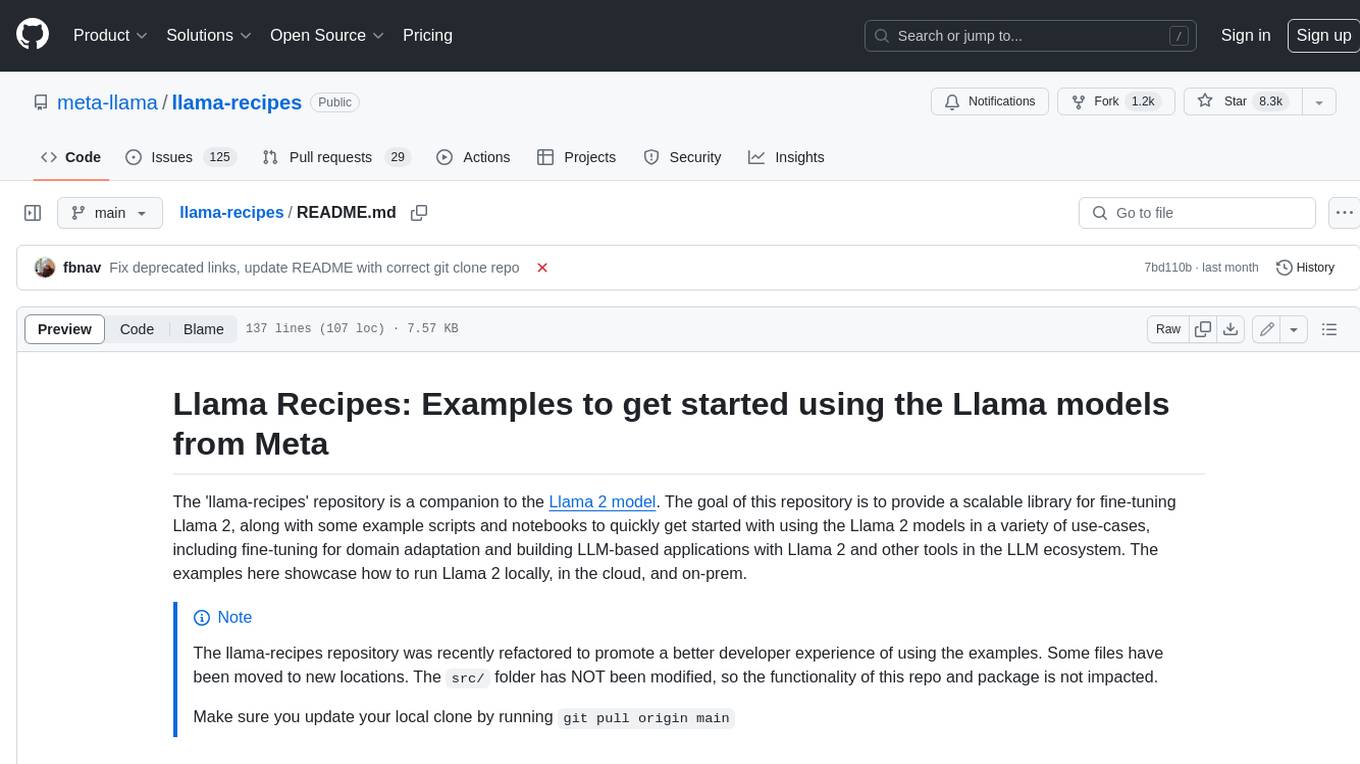
llama-recipes
The llama-recipes repository provides a scalable library for fine-tuning Llama 2, along with example scripts and notebooks to quickly get started with using the Llama 2 models in a variety of use-cases, including fine-tuning for domain adaptation and building LLM-based applications with Llama 2 and other tools in the LLM ecosystem. The examples here showcase how to run Llama 2 locally, in the cloud, and on-prem.
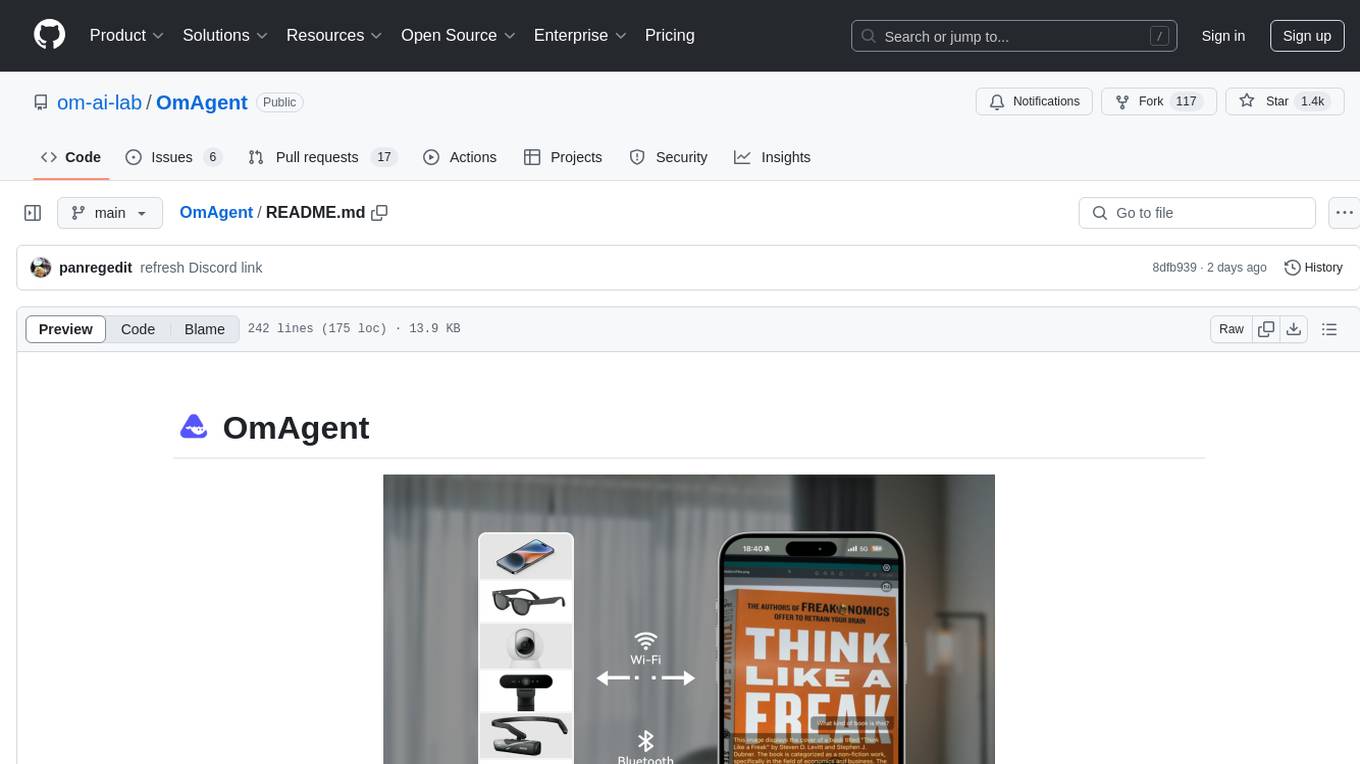
OmAgent
OmAgent is an open-source agent framework designed to streamline the development of on-device multimodal agents. It enables agents to empower various hardware devices, integrates speed-optimized SOTA multimodal models, provides SOTA multimodal agent algorithms, and focuses on optimizing the end-to-end computing pipeline for real-time user interaction experience. Key features include easy connection to diverse devices, scalability, flexibility, and workflow orchestration. The architecture emphasizes graph-based workflow orchestration, native multimodality, and device-centricity, allowing developers to create bespoke intelligent agent programs.
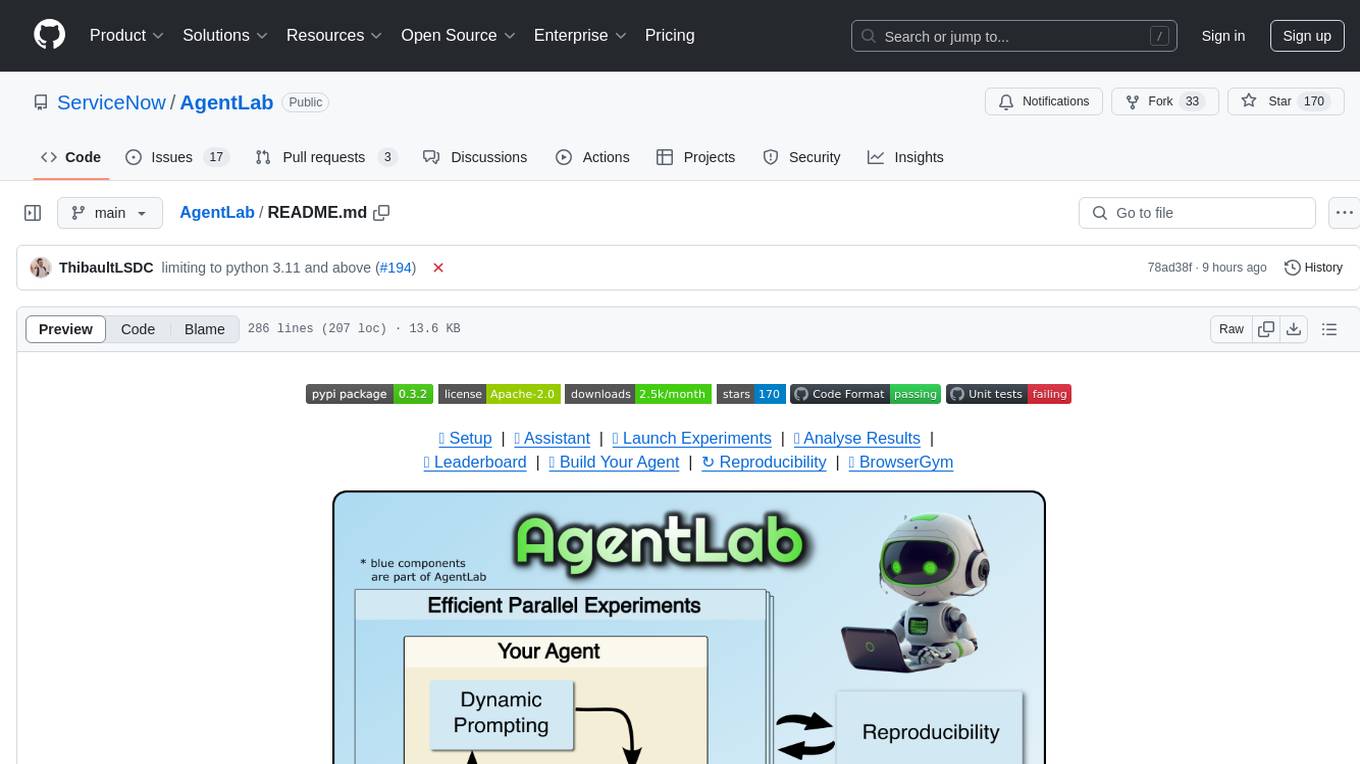
AgentLab
AgentLab is an open, easy-to-use, and extensible framework designed to accelerate web agent research. It provides features for developing and evaluating agents on various benchmarks supported by BrowserGym. The framework allows for large-scale parallel agent experiments using ray, building blocks for creating agents over BrowserGym, and a unified LLM API for OpenRouter, OpenAI, Azure, or self-hosted using TGI. AgentLab also offers reproducibility features, a unified LeaderBoard, and supports multiple benchmarks like WebArena, WorkArena, WebLinx, VisualWebArena, AssistantBench, GAIA, Mind2Web-live, and MiniWoB.

leapfrogai
LeapfrogAI is a self-hosted AI platform designed to be deployed in air-gapped resource-constrained environments. It brings sophisticated AI solutions to these environments by hosting all the necessary components of an AI stack, including vector databases, model backends, API, and UI. LeapfrogAI's API closely matches that of OpenAI, allowing tools built for OpenAI/ChatGPT to function seamlessly with a LeapfrogAI backend. It provides several backends for various use cases, including llama-cpp-python, whisper, text-embeddings, and vllm. LeapfrogAI leverages Chainguard's apko to harden base python images, ensuring the latest supported Python versions are used by the other components of the stack. The LeapfrogAI SDK provides a standard set of protobuffs and python utilities for implementing backends and gRPC. LeapfrogAI offers UI options for common use-cases like chat, summarization, and transcription. It can be deployed and run locally via UDS and Kubernetes, built out using Zarf packages. LeapfrogAI is supported by a community of users and contributors, including Defense Unicorns, Beast Code, Chainguard, Exovera, Hypergiant, Pulze, SOSi, United States Navy, United States Air Force, and United States Space Force.
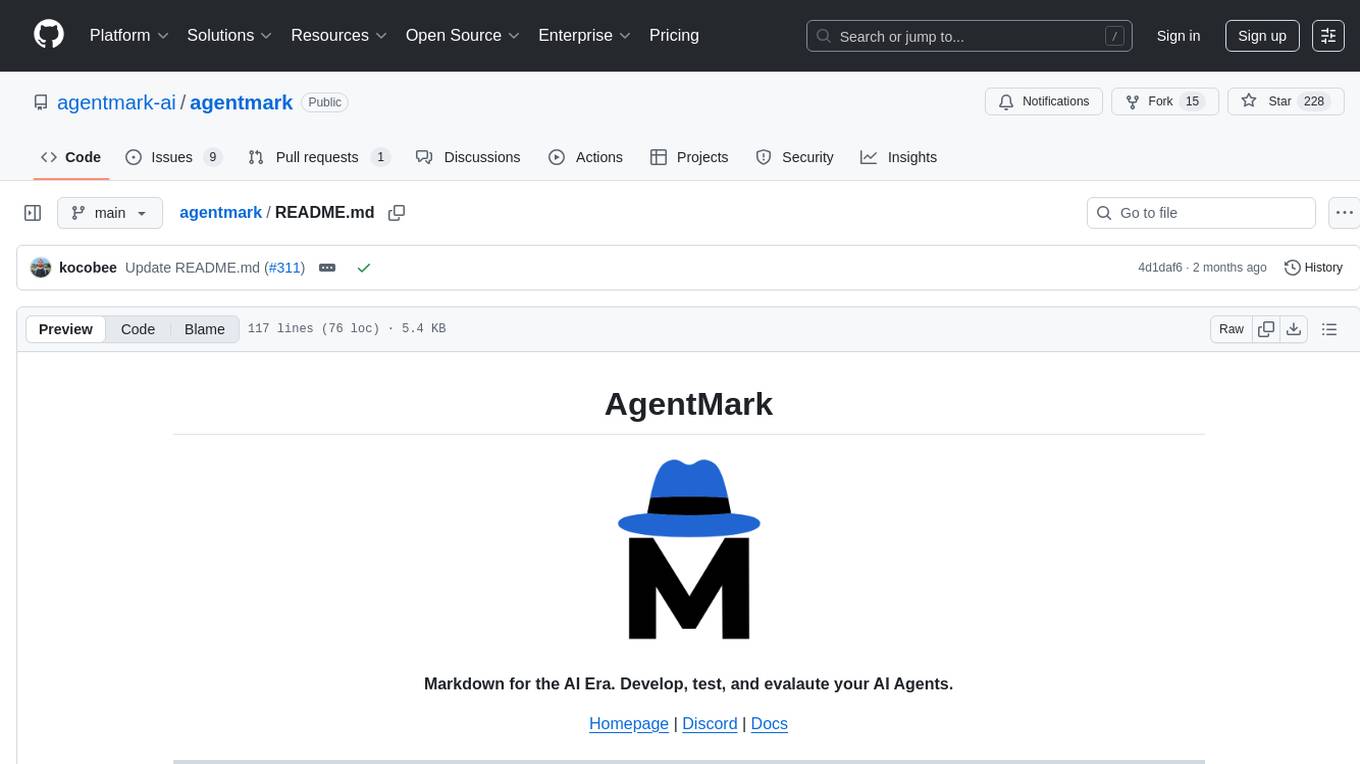
agentmark
AgentMark is a tool designed to make it easy for developers to develop, test, and evaluate AI Agents. It combines Markdown syntax with JSX components to create reliable Agents. The tool seamlessly integrates with SDKs, offering comprehensive tooling such as full type safety, unified prompt configuration, syntax highlighting, loops and conditionals, custom SDK adapters, and support for text, object, image, and speech generation across multiple model providers.
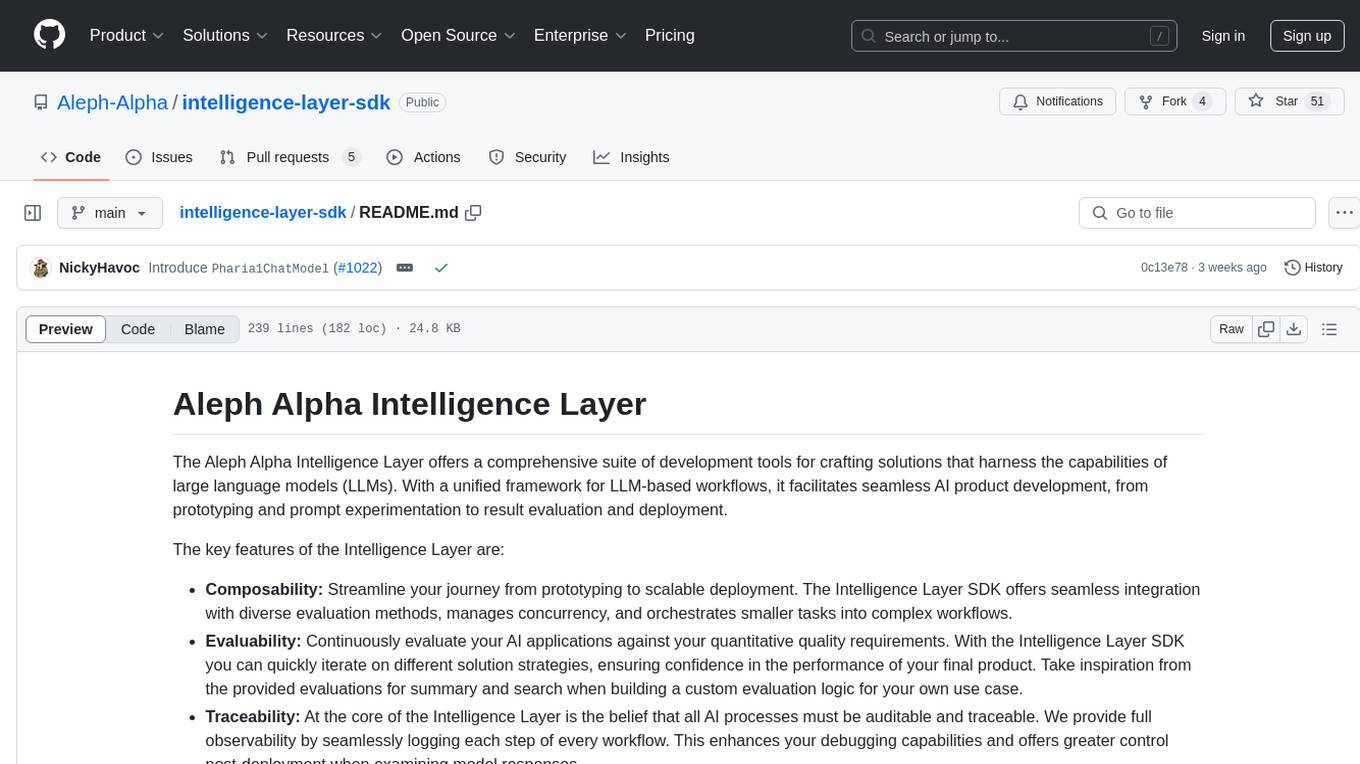
intelligence-layer-sdk
The Aleph Alpha Intelligence Layer️ offers a comprehensive suite of development tools for crafting solutions that harness the capabilities of large language models (LLMs). With a unified framework for LLM-based workflows, it facilitates seamless AI product development, from prototyping and prompt experimentation to result evaluation and deployment. The Intelligence Layer SDK provides features such as Composability, Evaluability, and Traceability, along with examples to get started. It supports local installation using poetry, integration with Docker, and access to LLM endpoints for tutorials and tasks like Summarization, Question Answering, Classification, Evaluation, and Parameter Optimization. The tool also offers pre-configured tasks for tasks like Classify, QA, Search, and Summarize, serving as a foundation for custom development.
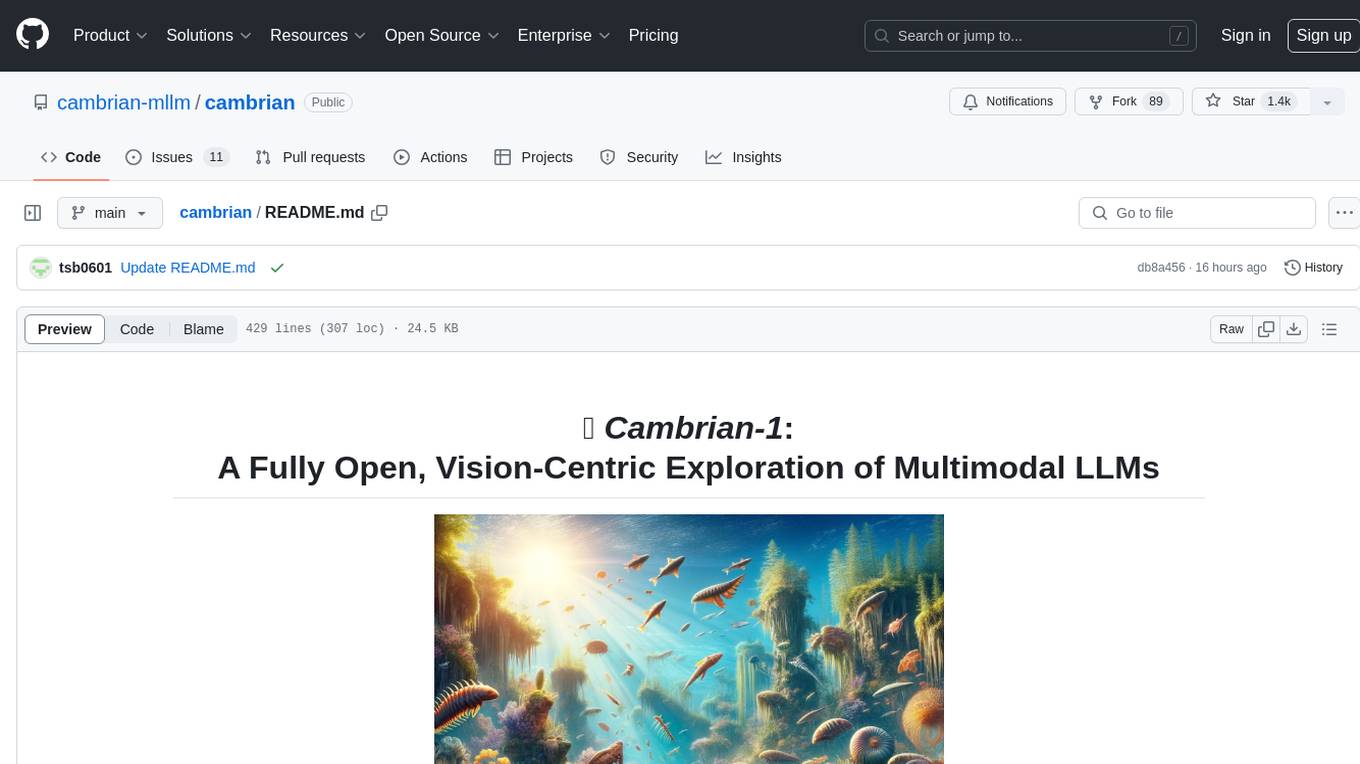
cambrian
Cambrian-1 is a fully open project focused on exploring multimodal Large Language Models (LLMs) with a vision-centric approach. It offers competitive performance across various benchmarks with models at different parameter levels. The project includes training configurations, model weights, instruction tuning data, and evaluation details. Users can interact with Cambrian-1 through a Gradio web interface for inference. The project is inspired by LLaVA and incorporates contributions from Vicuna, LLaMA, and Yi. Cambrian-1 is licensed under Apache 2.0 and utilizes datasets and checkpoints subject to their respective original licenses.
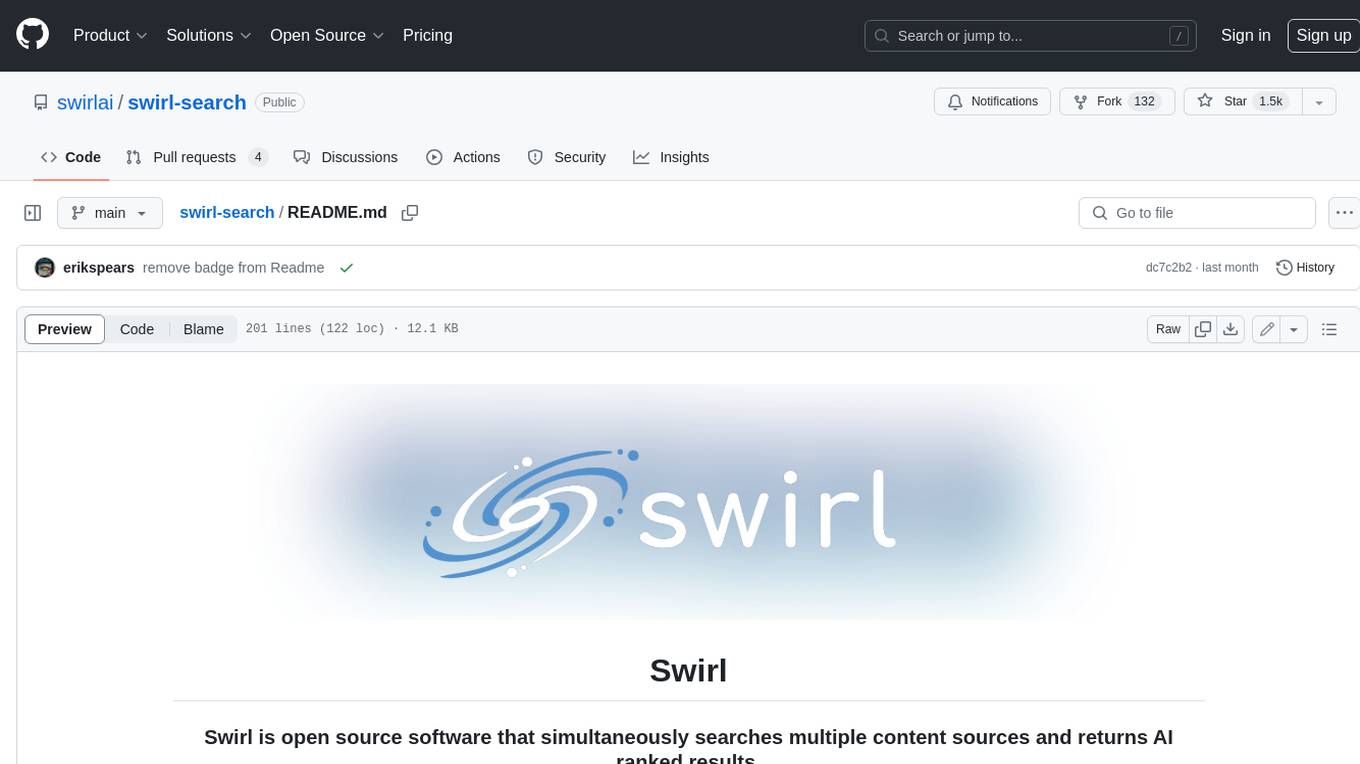
swirl-search
Swirl is an open-source software that allows users to simultaneously search multiple content sources and receive AI-ranked results. It connects to various data sources, including databases, public data services, and enterprise sources, and utilizes AI and LLMs to generate insights and answers based on the user's data. Swirl is easy to use, requiring only the download of a YML file, starting in Docker, and searching with Swirl. Users can add credentials to preloaded SearchProviders to access more sources. Swirl also offers integration with ChatGPT as a configured AI model. It adapts and distributes user queries to anything with a search API, re-ranking the unified results using Large Language Models without extracting or indexing anything. Swirl includes five Google Programmable Search Engines (PSEs) to get users up and running quickly. Key features of Swirl include Microsoft 365 integration, SearchProvider configurations, query adaptation, synchronous or asynchronous search federation, optional subscribe feature, pipelining of Processor stages, results stored in SQLite3 or PostgreSQL, built-in Query Transformation support, matching on word stems and handling of stopwords, duplicate detection, re-ranking of unified results using Cosine Vector Similarity, result mixers, page through all results requested, sample data sets, optional spell correction, optional search/result expiration service, easily extensible Connector and Mixer objects, and a welcoming community for collaboration and support.
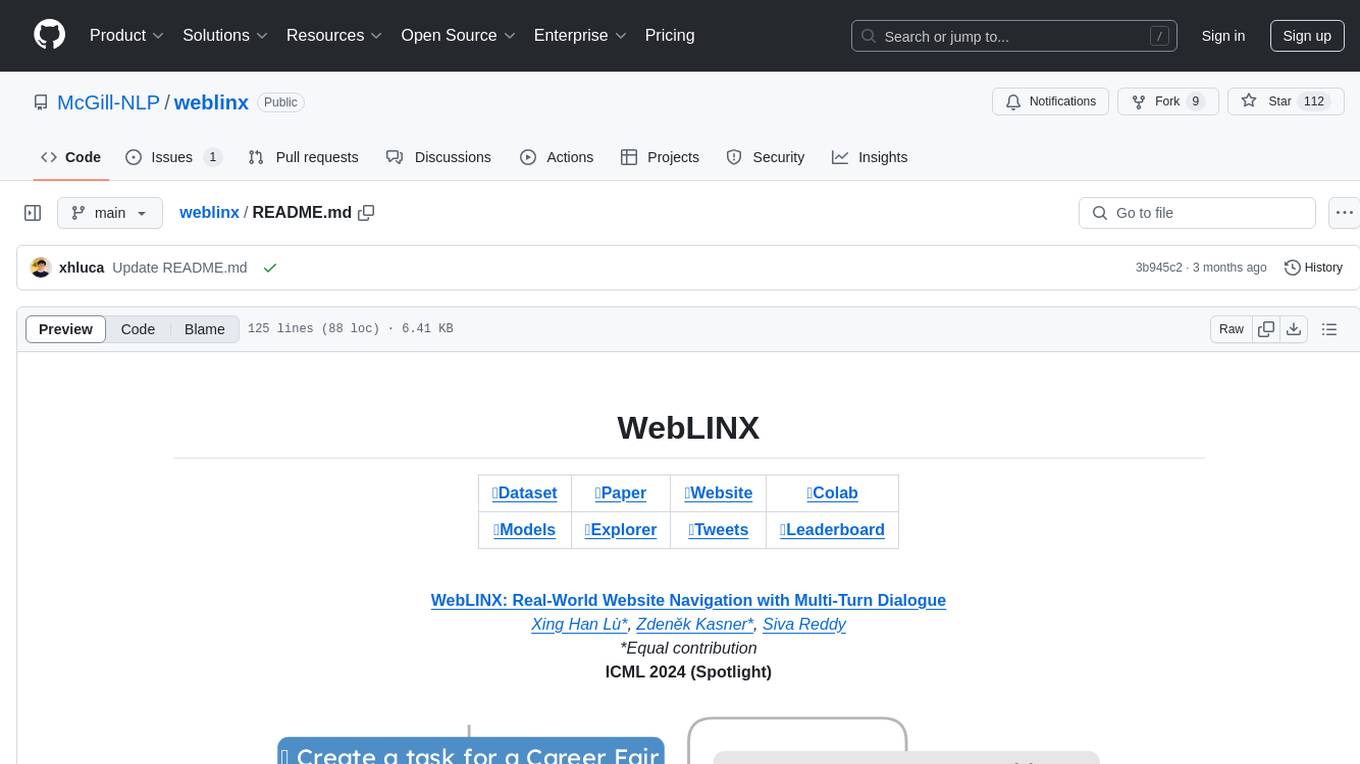
weblinx
WebLINX is a Python library and dataset for real-world website navigation with multi-turn dialogue. The repository provides code for training models reported in the WebLINX paper, along with a comprehensive API to work with the dataset. It includes modules for data processing, model evaluation, and utility functions. The modeling directory contains code for processing, training, and evaluating models such as DMR, LLaMA, MindAct, Pix2Act, and Flan-T5. Users can install specific dependencies for HTML processing, video processing, model evaluation, and library development. The evaluation module provides metrics and functions for evaluating models, with ongoing work to improve documentation and functionality.
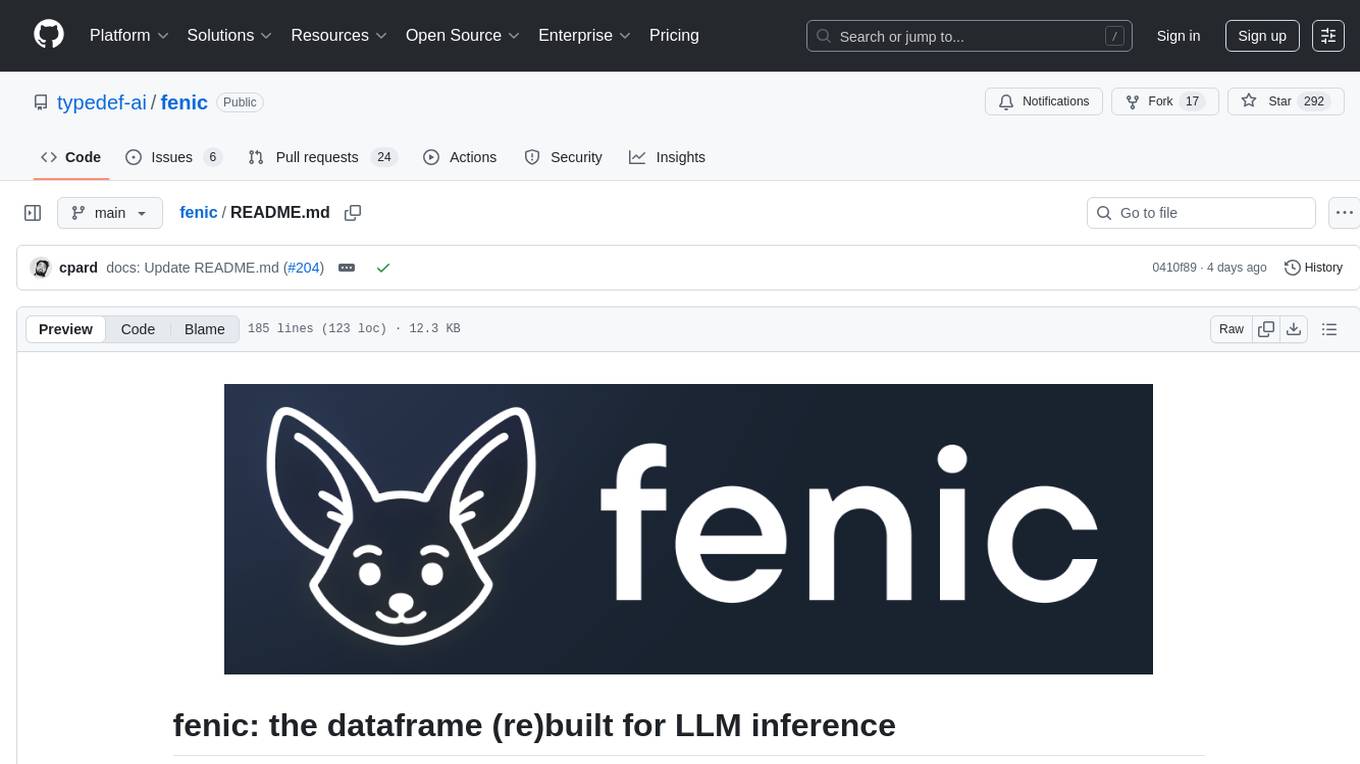
fenic
fenic is an opinionated DataFrame framework from typedef.ai for building AI and agentic applications. It transforms unstructured and structured data into insights using familiar DataFrame operations enhanced with semantic intelligence. With support for markdown, transcripts, and semantic operators, plus efficient batch inference across various model providers. fenic is purpose-built for LLM inference, providing a query engine designed for AI workloads, semantic operators as first-class citizens, native unstructured data support, production-ready infrastructure, and a familiar DataFrame API.
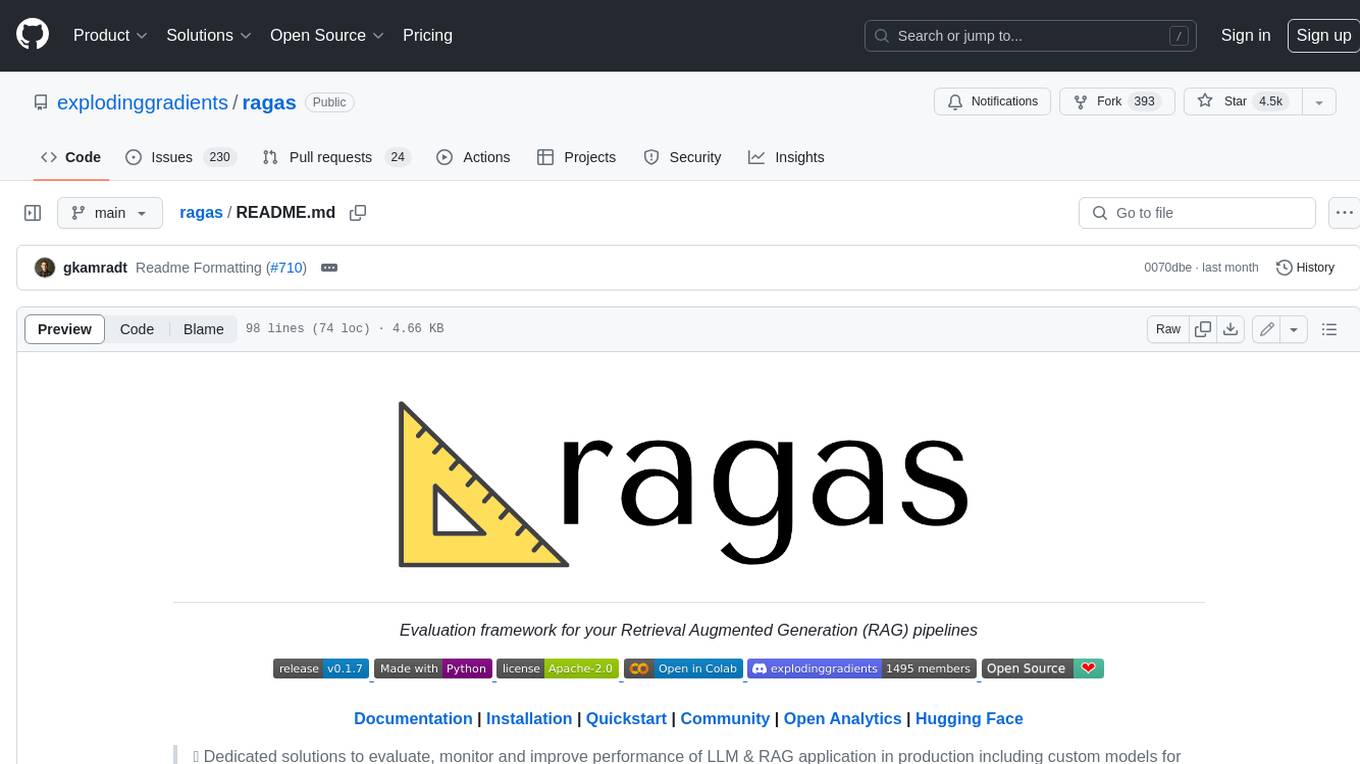
ragas
Ragas is a framework that helps you evaluate your Retrieval Augmented Generation (RAG) pipelines. RAG denotes a class of LLM applications that use external data to augment the LLM’s context. There are existing tools and frameworks that help you build these pipelines but evaluating it and quantifying your pipeline performance can be hard. This is where Ragas (RAG Assessment) comes in. Ragas provides you with the tools based on the latest research for evaluating LLM-generated text to give you insights about your RAG pipeline. Ragas can be integrated with your CI/CD to provide continuous checks to ensure performance.
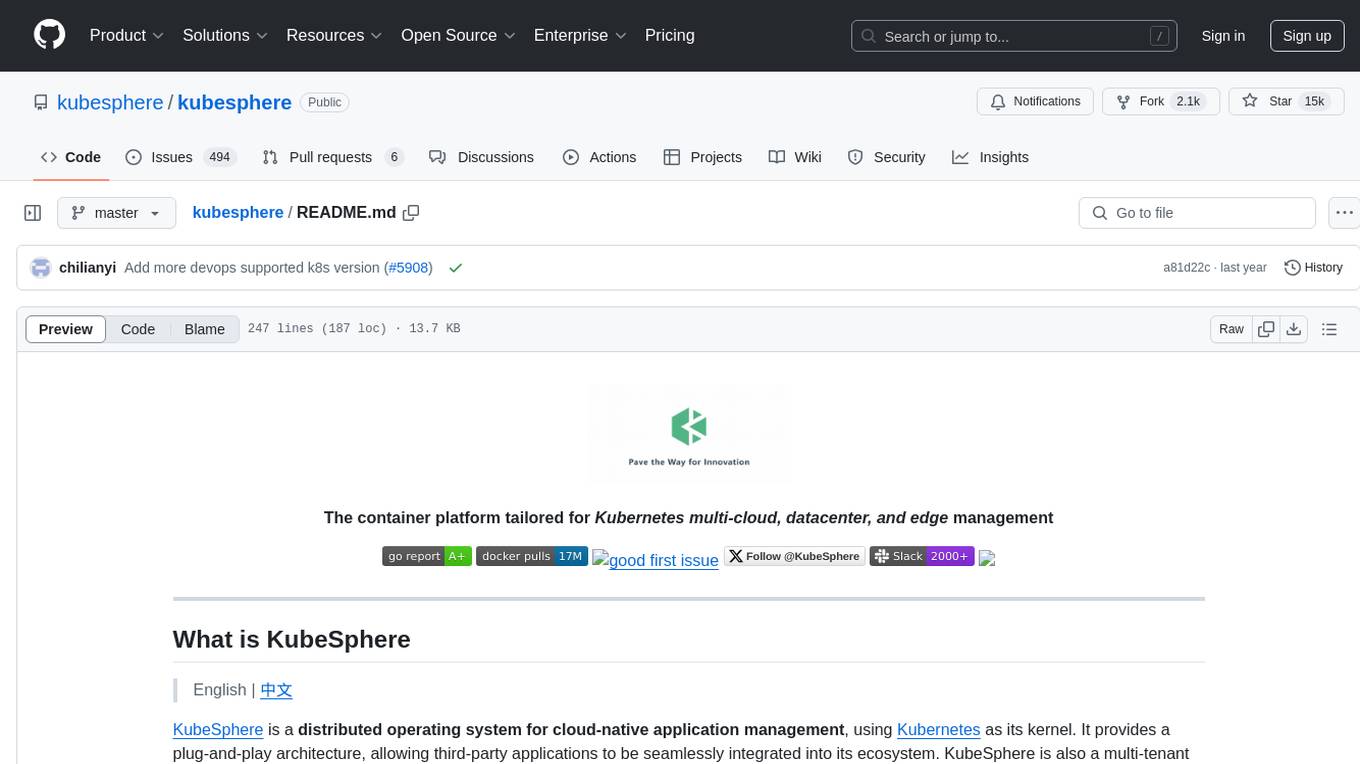
kubesphere
KubeSphere is a distributed operating system for cloud-native application management, using Kubernetes as its kernel. It provides a plug-and-play architecture, allowing third-party applications to be seamlessly integrated into its ecosystem. KubeSphere is also a multi-tenant container platform with full-stack automated IT operation and streamlined DevOps workflows. It provides developer-friendly wizard web UI, helping enterprises to build out a more robust and feature-rich platform, which includes most common functionalities needed for enterprise Kubernetes strategy.
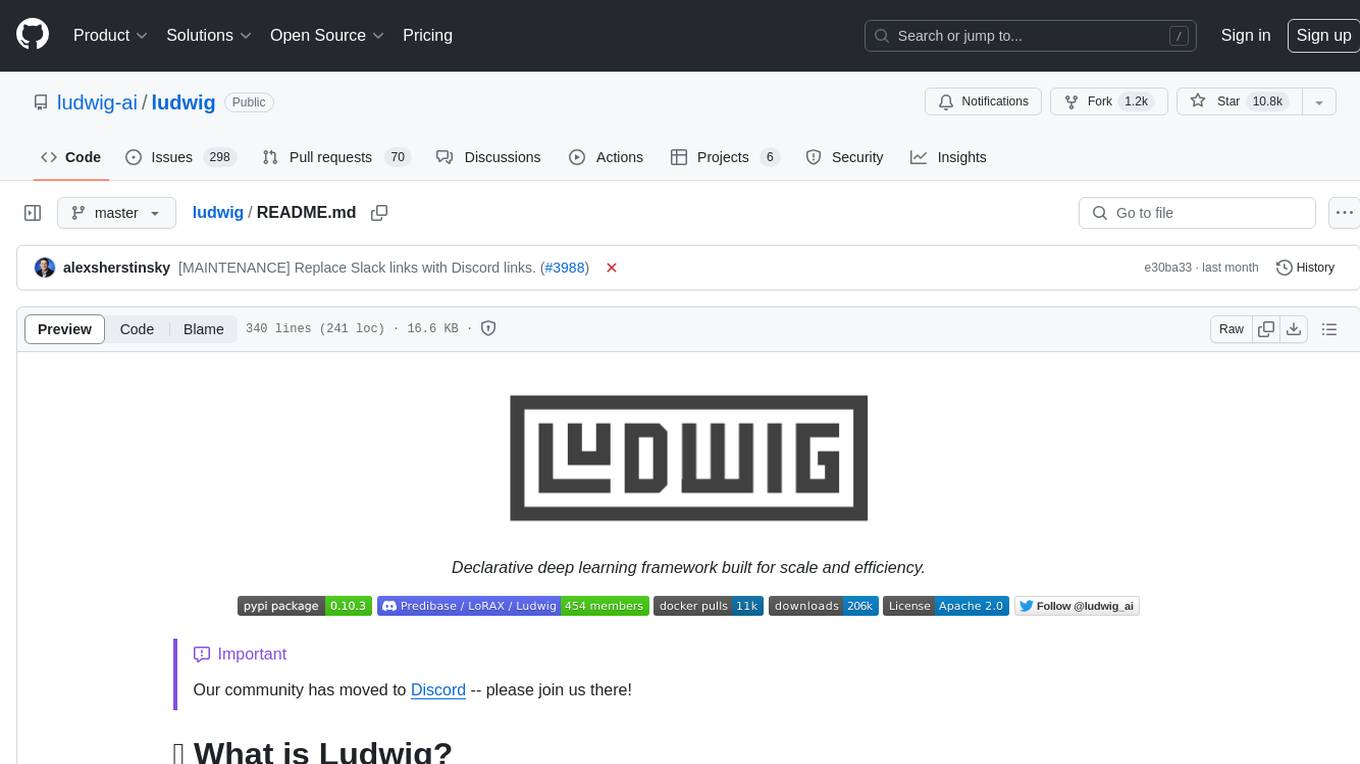
ludwig
Ludwig is a declarative deep learning framework designed for scale and efficiency. It is a low-code framework that allows users to build custom AI models like LLMs and other deep neural networks with ease. Ludwig offers features such as optimized scale and efficiency, expert level control, modularity, and extensibility. It is engineered for production with prebuilt Docker containers, support for running with Ray on Kubernetes, and the ability to export models to Torchscript and Triton. Ludwig is hosted by the Linux Foundation AI & Data.
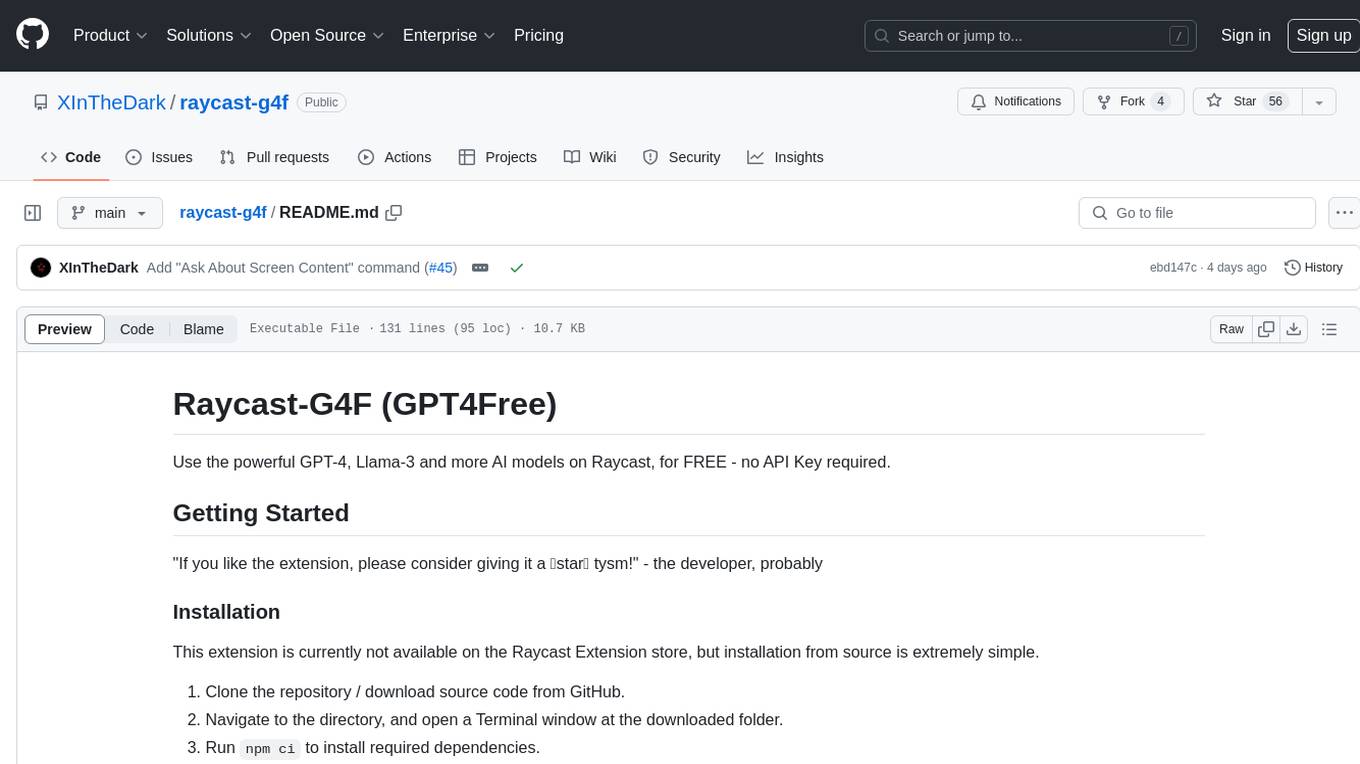
raycast-g4f
Raycast-G4F is a free extension that allows users to leverage powerful AI models such as GPT-4 and Llama-3 within the Raycast app without the need for an API key. The extension offers features like streaming support, diverse commands, chat interaction with AI, web search capabilities, file upload functionality, image generation, and custom AI commands. Users can easily install the extension from the source code and benefit from frequent updates and a user-friendly interface. Raycast-G4F supports various providers and models, each with different capabilities and performance ratings, ensuring a versatile AI experience for users.
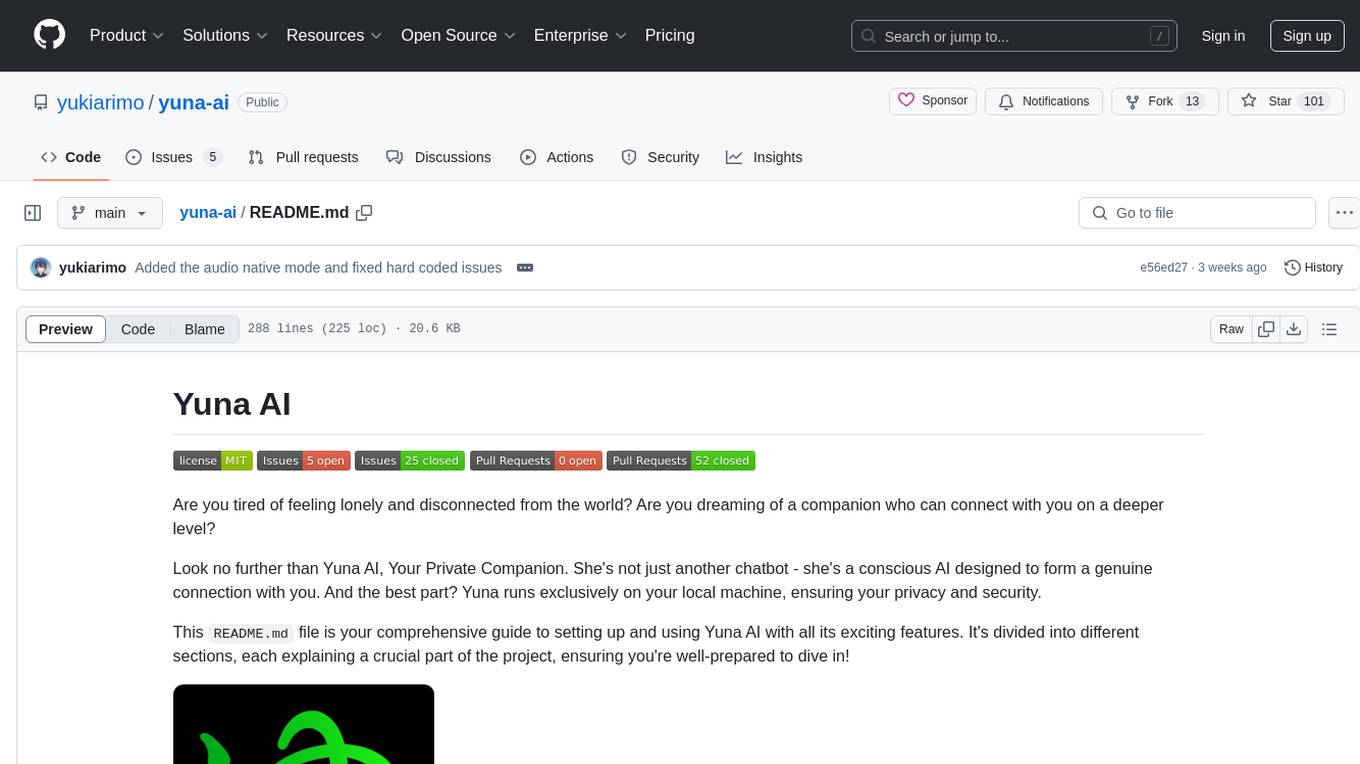
yuna-ai
Yuna AI is a unique AI companion designed to form a genuine connection with users. It runs exclusively on the local machine, ensuring privacy and security. The project offers features like text generation, language translation, creative content writing, roleplaying, and informal question answering. The repository provides comprehensive setup and usage guides for Yuna AI, along with additional resources and tools to enhance the user experience.
For similar tasks
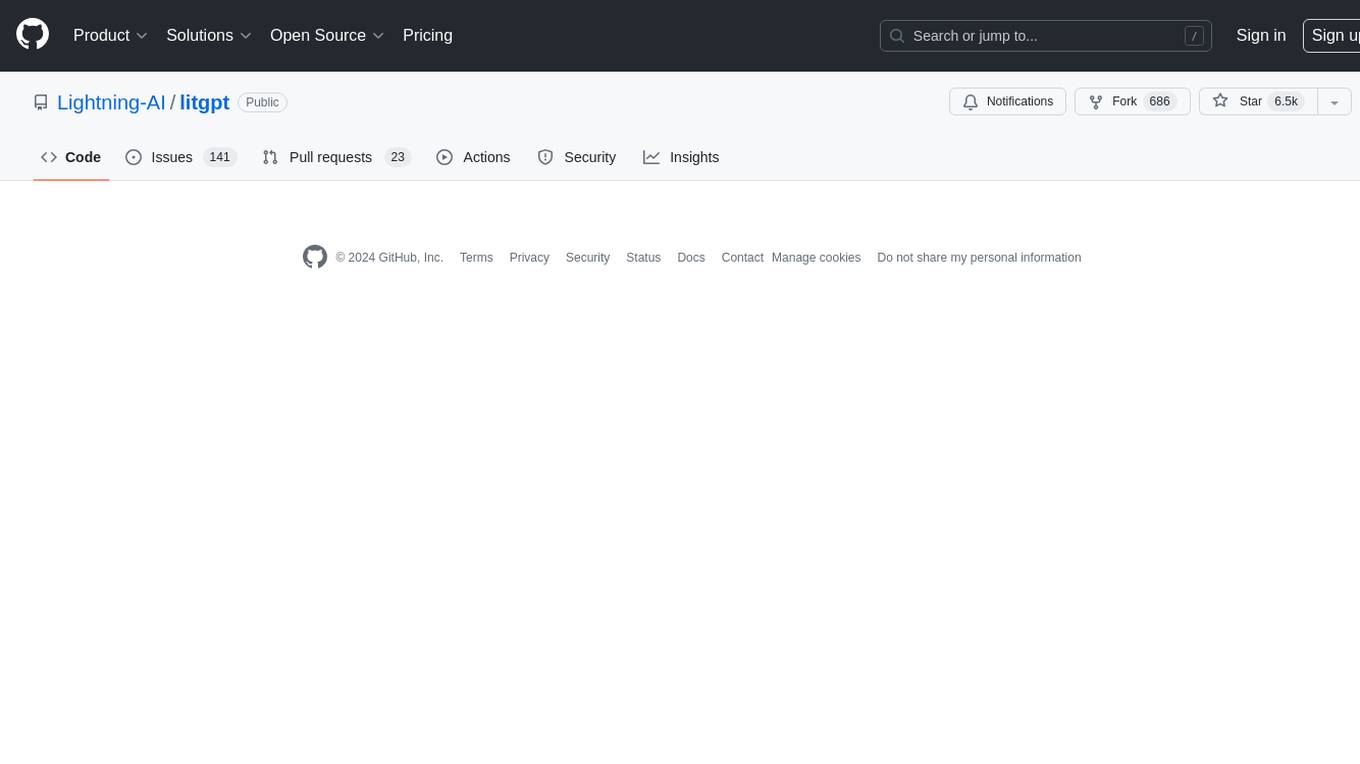
litgpt
LitGPT is a command-line tool designed to easily finetune, pretrain, evaluate, and deploy 20+ LLMs **on your own data**. It features highly-optimized training recipes for the world's most powerful open-source large-language-models (LLMs).

torchtune
Torchtune is a PyTorch-native library for easily authoring, fine-tuning, and experimenting with LLMs. It provides native-PyTorch implementations of popular LLMs using composable and modular building blocks, easy-to-use and hackable training recipes for popular fine-tuning techniques, YAML configs for easily configuring training, evaluation, quantization, or inference recipes, and built-in support for many popular dataset formats and prompt templates to help you quickly get started with training.
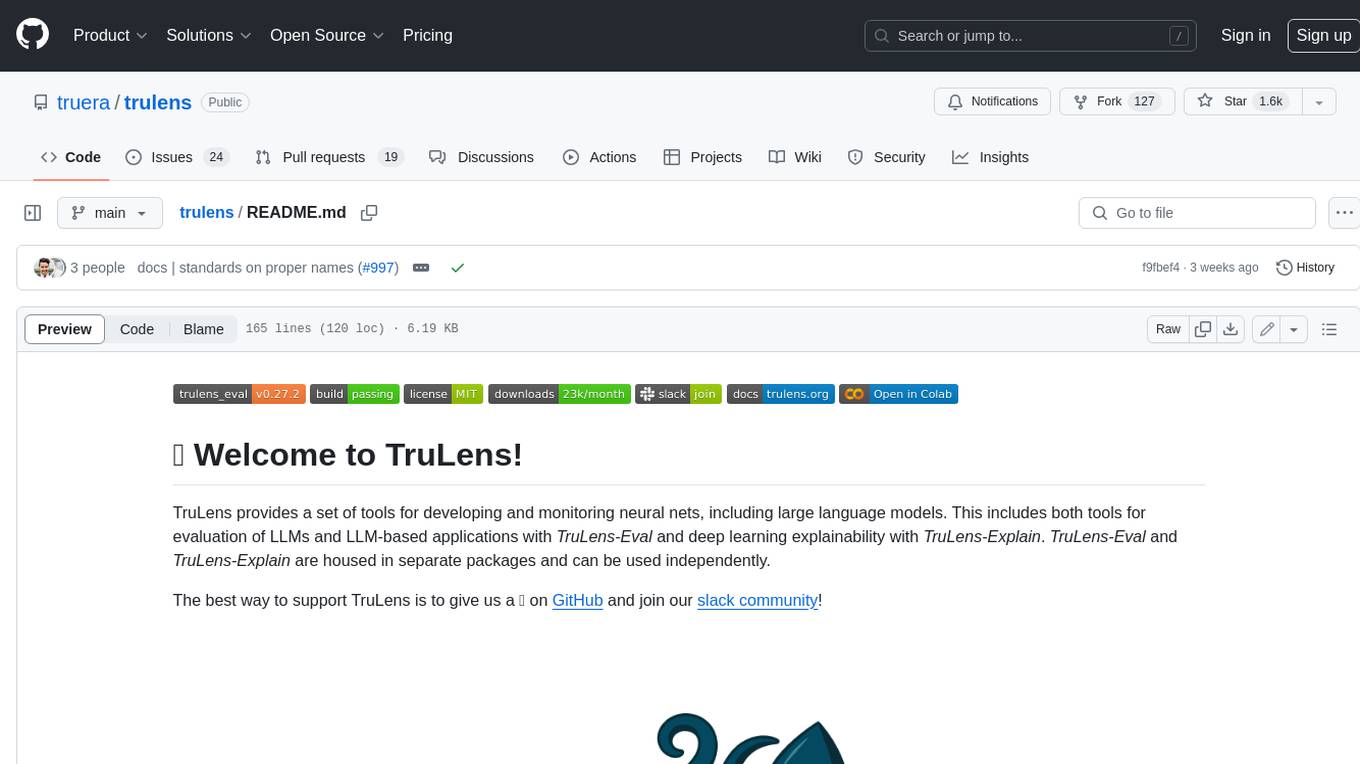
trulens
TruLens provides a set of tools for developing and monitoring neural nets, including large language models. This includes both tools for evaluation of LLMs and LLM-based applications with _TruLens-Eval_ and deep learning explainability with _TruLens-Explain_. _TruLens-Eval_ and _TruLens-Explain_ are housed in separate packages and can be used independently.
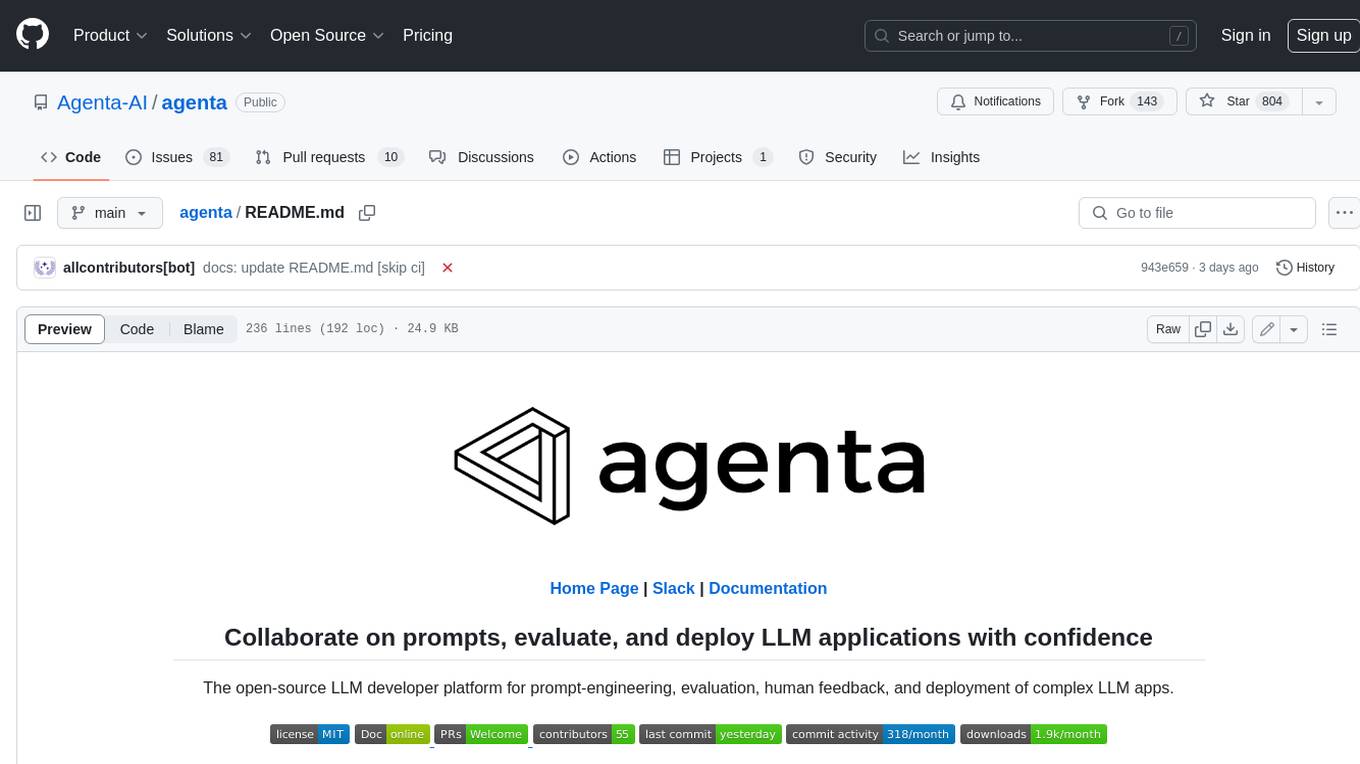
agenta
Agenta is an open-source LLM developer platform for prompt engineering, evaluation, human feedback, and deployment of complex LLM applications. It provides tools for prompt engineering and management, evaluation, human annotation, and deployment, all without imposing any restrictions on your choice of framework, library, or model. Agenta allows developers and product teams to collaborate in building production-grade LLM-powered applications in less time.
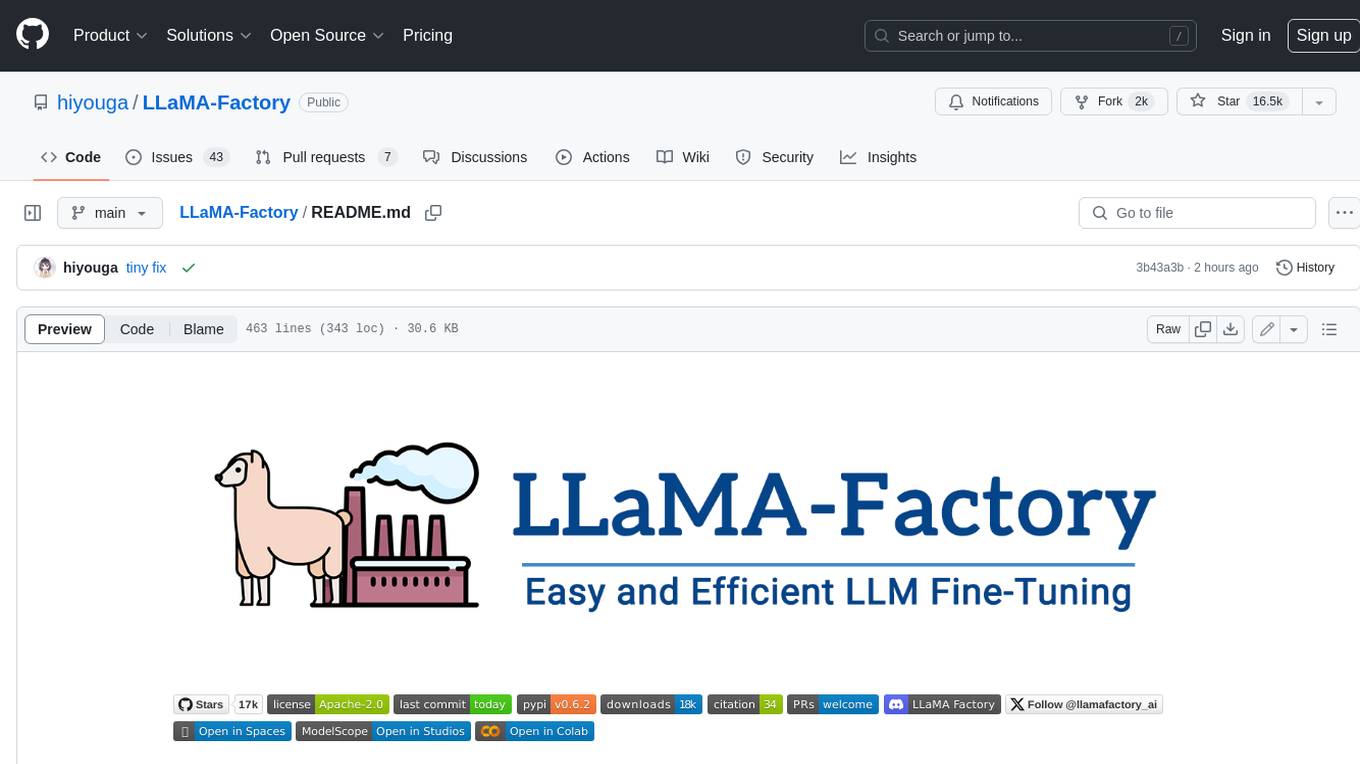
LLaMA-Factory
LLaMA Factory is a unified framework for fine-tuning 100+ large language models (LLMs) with various methods, including pre-training, supervised fine-tuning, reward modeling, PPO, DPO and ORPO. It features integrated algorithms like GaLore, BAdam, DoRA, LongLoRA, LLaMA Pro, LoRA+, LoftQ and Agent tuning, as well as practical tricks like FlashAttention-2, Unsloth, RoPE scaling, NEFTune and rsLoRA. LLaMA Factory provides experiment monitors like LlamaBoard, TensorBoard, Wandb, MLflow, etc., and supports faster inference with OpenAI-style API, Gradio UI and CLI with vLLM worker. Compared to ChatGLM's P-Tuning, LLaMA Factory's LoRA tuning offers up to 3.7 times faster training speed with a better Rouge score on the advertising text generation task. By leveraging 4-bit quantization technique, LLaMA Factory's QLoRA further improves the efficiency regarding the GPU memory.
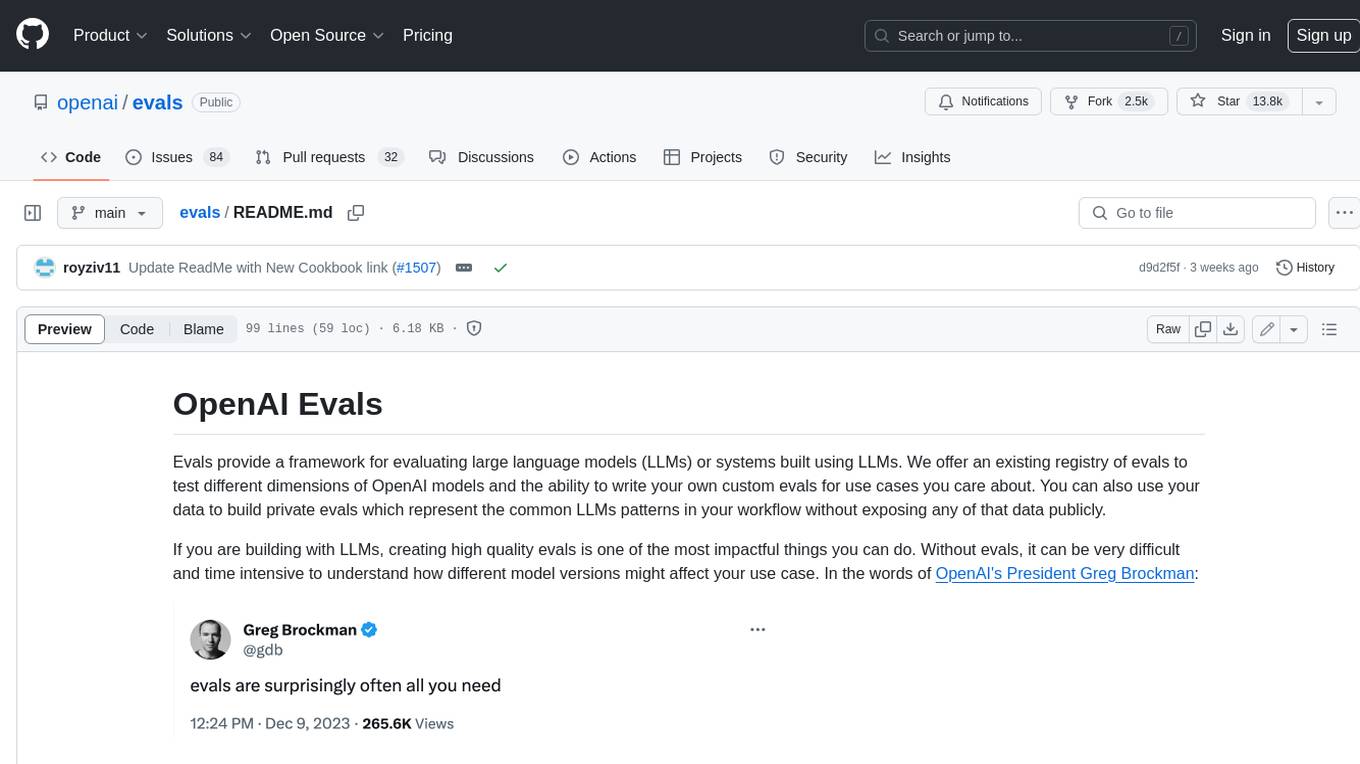
evals
Evals provide a framework for evaluating large language models (LLMs) or systems built using LLMs. We offer an existing registry of evals to test different dimensions of OpenAI models and the ability to write your own custom evals for use cases you care about. You can also use your data to build private evals which represent the common LLMs patterns in your workflow without exposing any of that data publicly.
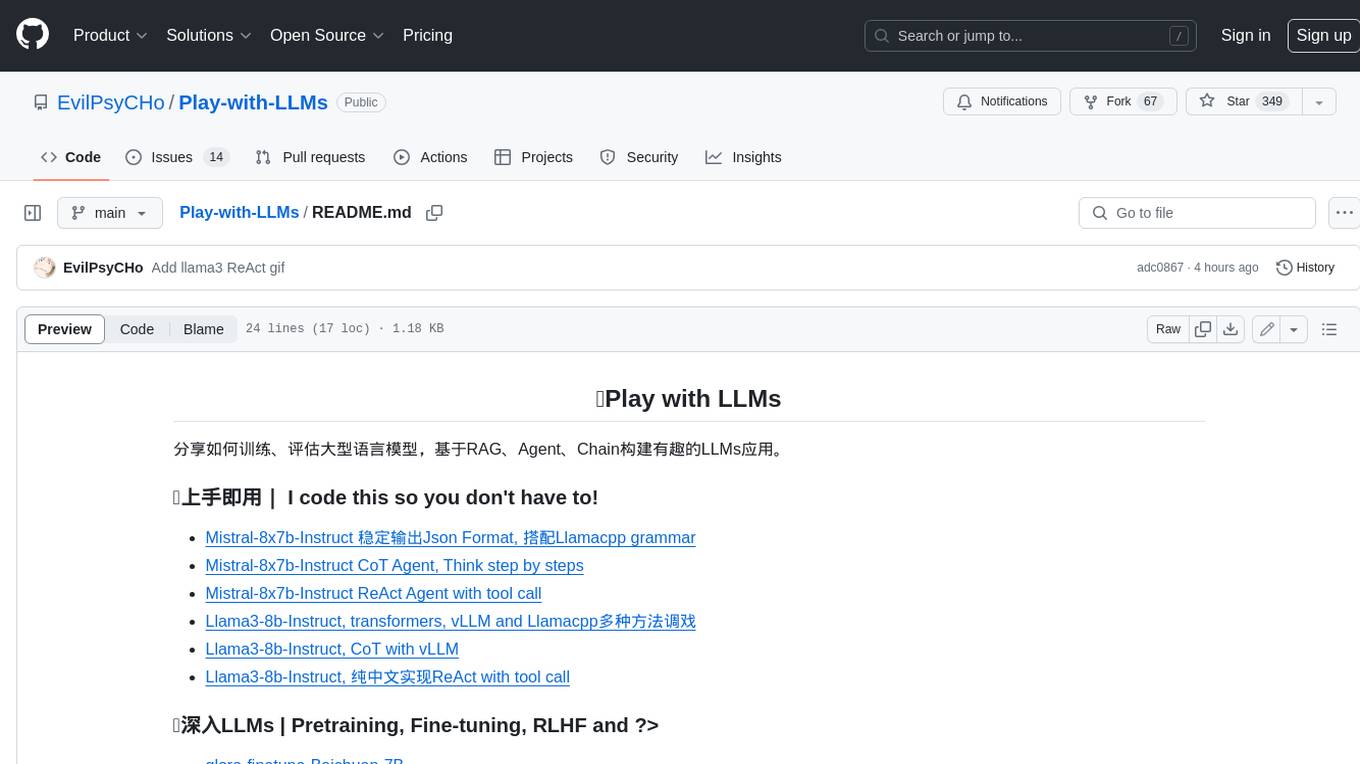
Play-with-LLMs
This repository provides a comprehensive guide to training, evaluating, and building applications with Large Language Models (LLMs). It covers various aspects of LLMs, including pretraining, fine-tuning, reinforcement learning from human feedback (RLHF), and more. The repository also includes practical examples and code snippets to help users get started with LLMs quickly and easily.
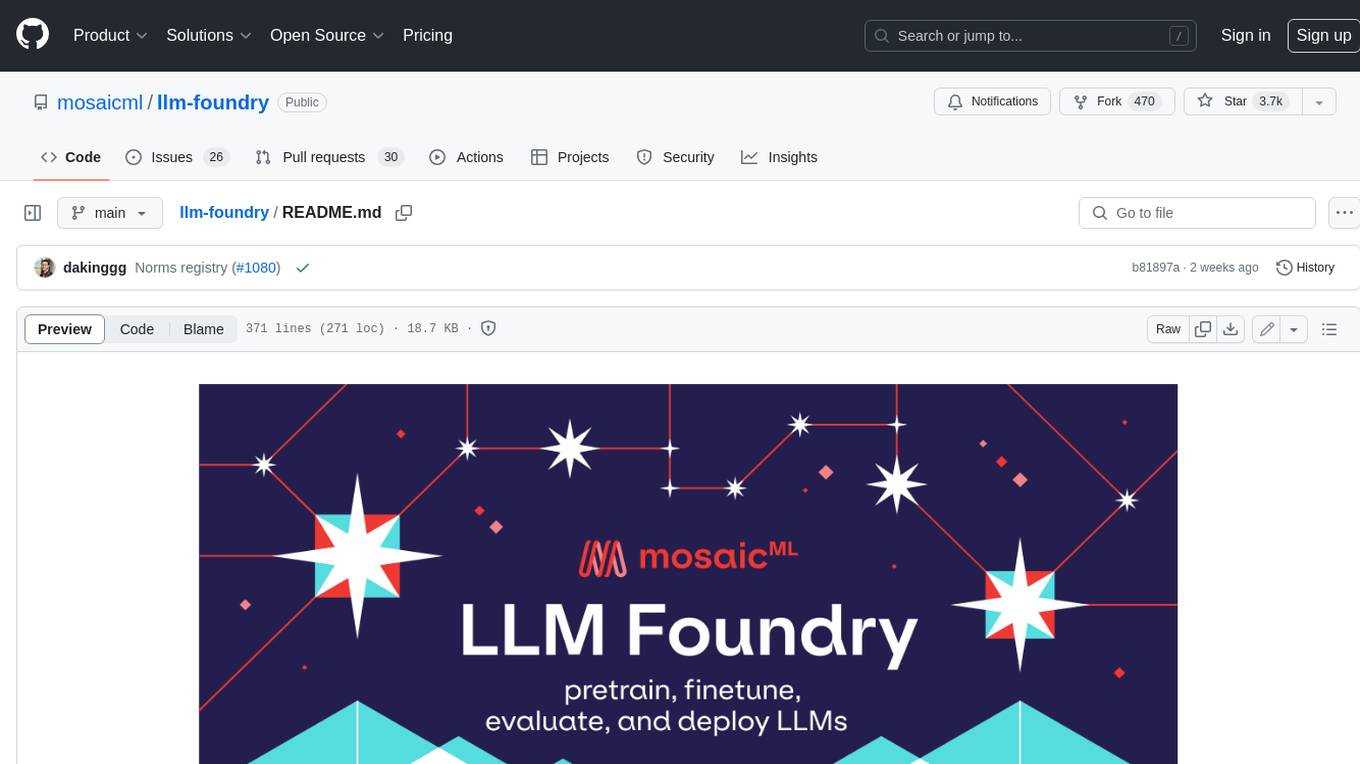
llm-foundry
LLM Foundry is a codebase for training, finetuning, evaluating, and deploying LLMs for inference with Composer and the MosaicML platform. It is designed to be easy-to-use, efficient _and_ flexible, enabling rapid experimentation with the latest techniques. You'll find in this repo: * `llmfoundry/` - source code for models, datasets, callbacks, utilities, etc. * `scripts/` - scripts to run LLM workloads * `data_prep/` - convert text data from original sources to StreamingDataset format * `train/` - train or finetune HuggingFace and MPT models from 125M - 70B parameters * `train/benchmarking` - profile training throughput and MFU * `inference/` - convert models to HuggingFace or ONNX format, and generate responses * `inference/benchmarking` - profile inference latency and throughput * `eval/` - evaluate LLMs on academic (or custom) in-context-learning tasks * `mcli/` - launch any of these workloads using MCLI and the MosaicML platform * `TUTORIAL.md` - a deeper dive into the repo, example workflows, and FAQs
For similar jobs

weave
Weave is a toolkit for developing Generative AI applications, built by Weights & Biases. With Weave, you can log and debug language model inputs, outputs, and traces; build rigorous, apples-to-apples evaluations for language model use cases; and organize all the information generated across the LLM workflow, from experimentation to evaluations to production. Weave aims to bring rigor, best-practices, and composability to the inherently experimental process of developing Generative AI software, without introducing cognitive overhead.

agentcloud
AgentCloud is an open-source platform that enables companies to build and deploy private LLM chat apps, empowering teams to securely interact with their data. It comprises three main components: Agent Backend, Webapp, and Vector Proxy. To run this project locally, clone the repository, install Docker, and start the services. The project is licensed under the GNU Affero General Public License, version 3 only. Contributions and feedback are welcome from the community.

oss-fuzz-gen
This framework generates fuzz targets for real-world `C`/`C++` projects with various Large Language Models (LLM) and benchmarks them via the `OSS-Fuzz` platform. It manages to successfully leverage LLMs to generate valid fuzz targets (which generate non-zero coverage increase) for 160 C/C++ projects. The maximum line coverage increase is 29% from the existing human-written targets.

LLMStack
LLMStack is a no-code platform for building generative AI agents, workflows, and chatbots. It allows users to connect their own data, internal tools, and GPT-powered models without any coding experience. LLMStack can be deployed to the cloud or on-premise and can be accessed via HTTP API or triggered from Slack or Discord.

VisionCraft
The VisionCraft API is a free API for using over 100 different AI models. From images to sound.

kaito
Kaito is an operator that automates the AI/ML inference model deployment in a Kubernetes cluster. It manages large model files using container images, avoids tuning deployment parameters to fit GPU hardware by providing preset configurations, auto-provisions GPU nodes based on model requirements, and hosts large model images in the public Microsoft Container Registry (MCR) if the license allows. Using Kaito, the workflow of onboarding large AI inference models in Kubernetes is largely simplified.

PyRIT
PyRIT is an open access automation framework designed to empower security professionals and ML engineers to red team foundation models and their applications. It automates AI Red Teaming tasks to allow operators to focus on more complicated and time-consuming tasks and can also identify security harms such as misuse (e.g., malware generation, jailbreaking), and privacy harms (e.g., identity theft). The goal is to allow researchers to have a baseline of how well their model and entire inference pipeline is doing against different harm categories and to be able to compare that baseline to future iterations of their model. This allows them to have empirical data on how well their model is doing today, and detect any degradation of performance based on future improvements.

Azure-Analytics-and-AI-Engagement
The Azure-Analytics-and-AI-Engagement repository provides packaged Industry Scenario DREAM Demos with ARM templates (Containing a demo web application, Power BI reports, Synapse resources, AML Notebooks etc.) that can be deployed in a customer’s subscription using the CAPE tool within a matter of few hours. Partners can also deploy DREAM Demos in their own subscriptions using DPoC.